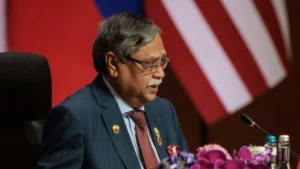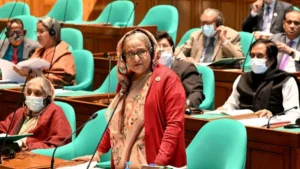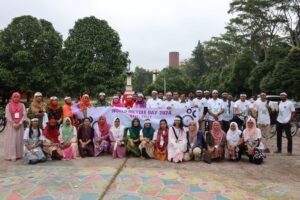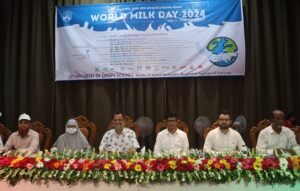Bangladesh is renowned for being one of the world’s most densely-populated countries, with its inhabitants dwelling in a river delta that drains into the Bay of Bengal.
Despite widespread poverty, Bangladesh has made significant strides in recent years, curbing population growth and enhancing health and education services.
Having emerged as an independent nation in 1971 following a bitter war that led to the separation of East Pakistan from the rest of Pakistan, Bangladesh has undergone a tumultuous journey. The country endured 15 years of military rule before the restoration of democracy in 1990, yet its political landscape remains volatile.
In addition to political challenges, Bangladesh grapples with the rise of Islamist extremism, a trend that contrasts with its historically tolerant nature.
Geographically, Bangladesh is prone to natural disasters, particularly flooding and cyclones, owing to its low-lying terrain. Consequently, the nation faces significant vulnerability to the impacts of rising sea levels.
PEOPLE’S REPUBLIC OF BANGLADESH: FACTS
- Capital: Dhaka
- Area: 148,460 sq km
- Population: 165.1 million
- Language: Bengali
- Life expectancy: 71 years (men), 74 years (women)
LEADERS
- President: Mohammed Shahabuddin

Prime minister: Sheikh Hasina

Sheikh Hasina has secured her fourth consecutive term as prime minister in a contentious election held in January 2024, maintaining her position since 1996.
Her Awami League party and its allies clinched victory by winning 223 out of 300 parliamentary seats contested, amidst a boycott by the main opposition Bangladesh Nationalist Party (BNP) and preceded by mass arrests of BNP leaders and supporters.
Official reports indicated a low voter turnout of approximately 40%, although critics questioned the accuracy of these figures, suggesting possible inflation. By comparison, the previous election in 2018 boasted a turnout of over 80%.
Human Rights Watch (HRW) estimated that nearly 10,000 activists were detained following a violent clash at an opposition rally on October 28, 2023, which resulted in the deaths of at least 16 individuals and left over 5,500 injured. The government was accused of “filling prisons with the ruling Awami League’s political opponents” by HRW.
Concerns have been raised regarding the potential consolidation of power under the Awami League due to this latest electoral triumph.
Many observers anticipate that the government will maintain its stringent crackdown, especially if opposition parties and civil society groups persist in challenging the legitimacy of the administration.
The BNP opted to boycott the election after the Awami League dismissed their request for an independent caretaker government to oversee the polls.
TIMELINE
Some key dates in the history of Bangladesh:
1204 – Muslim conquest of Bengal.
14th Century – Rise of three city-states in Bengal: Sonargaon, Satgaon, and Lakhnauti.
1352 – Shamsuddin Ilyas Shah unifies the three city-states into the Bengal Sultanate, which dominates the region for much of the 14th, 15th, and 16th centuries.
17th Century – Bengal comes under the control of the Mughal Empire.
18th Century – Nawabs of Bengal, operating within the Mughal Empire, effectively rule the area.
1757 – After the Battle of Plassey, Bengal becomes the first region of the Indian subcontinent to be conquered by the British East India Company.
1947 – End of British colonial rule over India. A predominantly Muslim state, comprising East and West Pakistan, is established, with India in between. The two parts of Pakistan are separated by more than 1,500km of Indian territory.
1971 – Bangladesh (formerly East Pakistan) gains independence after a war with West Pakistan (now Pakistan), with India supporting the Bengali nationalists against Pakistan.
1973 – First parliamentary elections result in a landslide victory for the Awami League.
1975 – A military coup leads to the assassination of founding president Sheikh Mujibur Rahman and most of his family members, ending civilian rule.
1979 – Second parliamentary elections bring Ziaur Rahman’s Bangladesh Nationalist Party to power.
1981 – President Ziaur Rahman is assassinated during an unsuccessful military coup.
1982 – General Hussain Muhammad Ershad seizes power in a coup, suspending the constitution and political parties.
1991 – Bangladesh returns to a parliamentary system of government.
2006-2008 – Political crisis ensues with leaders of both major parties briefly detained.
2014-17 – Bangladesh experiences a wave of violence perpetrated by Islamists against bloggers, atheists, and secular intellectuals.








